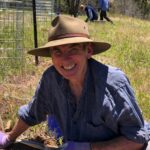It may be too slow but the policy environment around climate change is moving. Recently in NSW we have seen a mine proposal refused because of its impact on climate change and the release of a report calling for the development of a plan for the Hunter Valley to transition away from coal. In the USA calls for a Green New Deal have been released. But while all this grinds along, insects around the world are disappearing fast.
Last week the Chief Judge of the NSW Land and Environment Court ruled that the proposed Rocky Hill open-cut coal mine near the small rural town of Gloucester could not proceed. To start with, it is quite unusual for an application for a new coal mine or a mine extension to be refused planning permission in NSW. The really remarkable element of last week’s decision, however, was Justice Preston’s two principal reasons: the mine’s detrimental impact on the social fabric of Gloucester and on climate change. He characterised the proposed mine as being in the wrong place and the wrong time. In considering climate change to be a material factor the Judge has led the way legally not only in NSW but also Australia generally. It remains to be seen how much of a precedent this decision will be in future planning applications regarding coal, gas and oil mines.
A little to the south of Gloucester is the Hunter Valley, a major coal mining area, particularly for export to Asia. As Australia stops mining coal, as it inevitably will, this is one of the regions that will need lots of support to help it transition to a new economic base. The activist group Lock The Gate and the University of Western Sydney have just released a report making the case for a well-planned transition. Without a plan, 5000 jobs and $700 million per year in wages will be progressively lost with nothing to take their place. Implement a plan to develop renewable energy sources, manufacturing, agriculture (for instance wine and horse breeding) and tourism as coal dies and the area could gain 600 jobs. Simples! Of course, not everyone sees it that way. And just in case you’re scratching your head wondering about the Coal Council of Australia, it was established on 1 February 2019 by Greg Evans, a former Executive Director of the Minerals Council of Australia.
Meanwhile, newly elected Democratic Representative for New York state Alexandria Ocasio-Cortez has wasted no time in unveiling ideas for a Green New Deal for the USA. Taking inspiration from Roosevelt’s 1930s New Deal to combat the great depression, the fundamental idea is that the USA now has two urgent priorities – tackling social injustice and tackling climate change – and that the two cannot be separated. That is, neither can be put on hold while the other is dealt with. Ocasio-Cortez has been characterised as a democratic socialist but it isn’t obvious that she is planning to challenge capitalism. Yet one of the unresolved issues, and one seldom discussed in polite society, is whether capitalism has the economic tools to get us out of the environmental crisis that capitalism itself has created. The Green New Deal discussion has a long way to run before anything happens in the USA but don’t expect it to go away.
Ever wondered how many different species of microorganisms, plants and animals there are in the world? Apparently it’s about 8.7 million of which 2.2 million live in the oceans and 6.5 million on land. And one way and another we are wiping them out at a tremendous rate as a result of loss of habitat, poisoning, climate change, over-harvesting and competition from introduced species. The expansion and intensification of agriculture is a major offender. A recent report, Worldwide decline of entomofauna, contains a prediction that 40% of insect species will be lost within decades. No more mozzies … great, or maybe not. Fewer insects means, amongst other things, less pollination and less recycling of dead material with deleterious consequences for natural ecosystems and human food supplies. We can, however, organise agriculture and land management very differently – regenerative agriculture – with much better environmental outcomes.
Which country has the most proven oil reserves at present? I’ve tabulated the data below for the seven oiliest nations, which hold three-quarters of the world’s total, from the BP Statistical Review of World Energy 2018. Surprisingly, it’s Venezuela. Although maybe not so surprising. Maybe it goes some way to explain Trump’s bellicose attitude towards the currently strife riven nation. Or maybe like Bush the Younger before him, he simply doesn’t like to think of anyone missing out on the benefits of democracy.
| Country | Thousand million barrels of proven oil reserves (2017) | % of world’s total proven oil reserves |
| Venezuela | 303 | 18 |
| Saudi Arabia | 266 | 16 |
| Canada | 169 | 10 |
| Iran | 157 | 9 |
| Iraq | 149 | 9 |
| Russian Federation | 106 | 6 |
| Kuwait | 102 | 6 |
| WORLD | 1697 | 100 |




